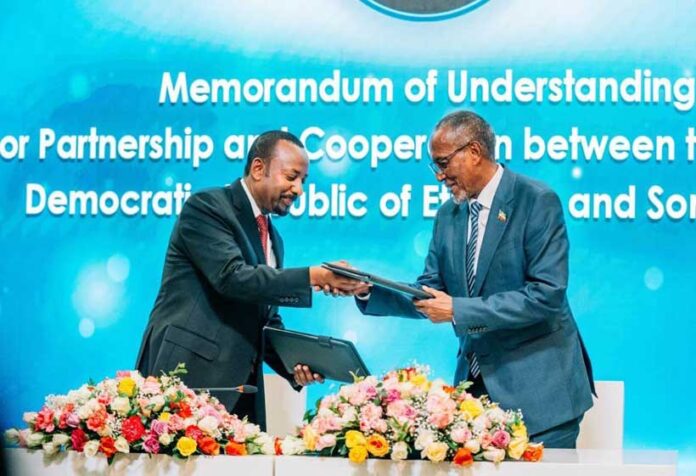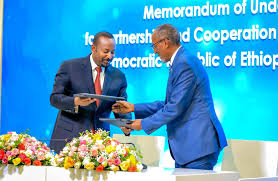THE ADDIS-HARGEIsA MoU– an Ethiopian invatIon or occupation of Somaliland, a territory legally part and parcel of the Federal Republic of Somalia. The MoU illegaly provides Ethiopia the souvernity of at least 2200 sq² Kilo metrers over territory part and parcel of Federal Republic of Somalia. The MoU will also affect the the rights of Somalia to manage its natural ressourses on/under surface, territorial waters, economic zones and so will complicate the harmony of all treaties; bilateral, regional and international.
An aggression, invation or occupation of sovereign territories, such as the unrecognized Somaliland, by another country, in this case, Ethiopia, could have significant implications on peace and security, both locally and regionally. Here’s how such actions could impact the stability and security of the region:
1. Local and Regional Instability:
Any form of aggression or occupation of sovereign territories is likely to lead to heightened tensions, conflict, and instability within the affected region. This could manifest in the form of protests meanwhile resistance movements, civil strive and potential violent confrontations between opposing parties.
2. Potential for Escalation:
Firstly aggression on territorial integrity could potentially lead to a broader escalation of conflict, drawing in neighboring countries, regional actors, and international stakeholders. Clearly in the case of Somalia and Somaliland, the involvement of neighboring countries and regional organizations could further complicate the conflict and undermine regional stability.
3. Erosion of Trust and Diplomatic Relations:
Actions that threaten the territorial integrity of a sovereign nation are likely to lead to a breakdown in diplomatic relations between the countries involved. This erosion of trust and diplomacy can have far-reaching implications, affecting not only the countries directly involved but also impacting regional alliances and international relations.
4. Humanitarian Crisis:
Aggression and occupation often result in humanitarian crises, including displacement of populations, disruptions to essential services, and human rights abuses. The resulting humanitarian crisis could place significant strain on neighboring countries and the broader international community to provide aid and support to affected populations.
5. Economic Disruption:
Especially conflict and aggression have the potential to disrupt economic activities, trade routes, and vital infrastructure, leading to economic hardship for not only the directly affected areas but also neighboring regions. This disruption can have a ripple effect on the economic stability of the entire region.
6. Regional Power Dynamics:
Aggression and occupation can shift the balance of power within a region, leading to realignments of alliances and potential power struggles among regional actors. Indeed this can have long-term implications for regional stability and security.
7. International Response and Intervention:
Aggression and occupation of sovereign territories could prompt international condemnation and calls for intervention by global organizations, including the United Nations and regional bodies such as the African Union. Along with this may lead to international sanctions , not only activation of collective measures but also other diplomatic measures aimed at restoring peace and security in the region.
8. Long-Term Conflict Resolution Challenges:
Resolving conflicts resulting from aggression and occupation can be complex and protracted. Hence it often requires extensive diplomatic efforts, negotiation, and potentially the involvement of mediators or peacekeeping forces to achieve a sustainable resolution.
In conclusion, aggression on territorial integrity and occupation of sovereign territories can have profound implications for peace and security, not only locally but also regionally. Therefore it is crucial for all parties involved to prioritize dialogue, diplomacy, and peaceful means of resolving disputes to prevent the destabilization of the region and to uphold the principles of international law and territorial sovereignty, the shortest way being the simple revocation of the so-called MoU and come back to the domain of internation law and order.





